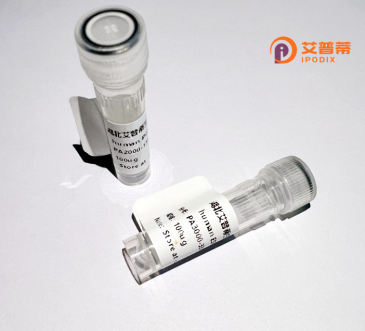
| 纯度 | >90%SDS-PAGE. |
| 种属 | Human |
| 靶点 | CUTL1 |
| Uniprot No | P39880 |
| 内毒素 | < 0.01EU/μg |
| 表达宿主 | E.coli |
| 表达区间 | 521-620aa |
| 氨基酸序列 | AENRLAQHTLQALQSELDSLRADNIKLFEKIKFLQSYPGRGSGSDDTELRYSSQYEERLDPFSSFSKRERQRKYLSLSPWDKATLSMGRLVLSNKMARTI |
| 分子量 | 36.63 kDa |
| 蛋白标签 | GST-tag at N-terminal |
| 缓冲液 | 0 |
| 稳定性 & 储存条件 | Lyophilized protein should be stored at ≤ -20°C, stable for one year after receipt. Reconstituted protein solution can be stored at 2-8°C for 2-7 days. Aliquots of reconstituted samples are stable at ≤ -20°C for 3 months. |
| 复溶 | Always centrifuge tubes before opening.Do not mix by vortex or pipetting. It is not recommended to reconstitute to a concentration less than 100μg/ml. Dissolve the lyophilized protein in distilled water. Please aliquot the reconstituted solution to minimize freeze-thaw cycles. |
以下是3篇关于重组人CUTL1(CUX1)蛋白的文献示例及简要摘要:
---
1. **"CUTL1 is a target of TGFβ signaling that promotes cancer cell motility and invasiveness"**
- **作者**: Sansregret, L., Goulet, B., Harney, R., et al.
- **摘要**: 研究发现TGFβ信号通过SMAD蛋白激活CUTL1转录,重组CUTL1蛋白表达增强癌细胞迁移和侵袭能力,提示其在肿瘤转移中的作用。
---
2. **"Recombinant CUX1 DNA-binding domain inhibits E2F-mediated transcription and tumor growth"**
- **作者**: Ramdzan, Z.M., Vadnais, C., Pal, R., et al.
- **摘要**: 研究通过重组CUX1蛋白的DNA结合域阻断E2F转录因子活性,抑制肿瘤细胞增殖并延缓小鼠模型中肿瘤进展,验证其治疗潜力。
---
3. **"Alternative splicing of CUX1 generates a functional isoform promoting cell cycle progression"**
- **作者**: Michl, P., Downward, J.
- **摘要**: 利用重组CUX1可变剪接体证明p110-CUX1通过上调Cyclin E和CDK2加速G1/S期转换,揭示其调控细胞周期机制。
---
**备注**:若需更精准的文献,建议通过PubMed或Web of Science限定关键词(如“recombinant CUTL1”或“CUX1 protein”)检索近年研究。
**Background of Recombinant Human CUTL1 Protein**
Recombinant human CUTL1 (also known as Cux1 or CDP) is a DNA-binding transcription factor belonging to the CUT family, which plays critical roles in regulating gene expression during development and oncogenesis. CUTL1 contains conserved CUT domains and a homeodomain, enabling sequence-specific DNA binding and interaction with chromatin modifiers. It functions as a transcriptional repressor or activator, depending on cellular context, and participates in processes like cell cycle progression, differentiation, and epithelial-mesenchymal transition (EMT).
The CUTL1 gene is implicated in various cancers, including breast, prostate, and lung cancer, where its dysregulation promotes tumor growth, metastasis, and therapy resistance. Recombinant CUTL1 protein, typically produced in *E. coli* or mammalian expression systems, retains functional domains and is widely used *in vitro* to study DNA-protein interactions, transcriptional regulation, and signaling pathways. It also serves as a tool for identifying inhibitors targeting CUTL1-driven oncogenic pathways. Purified recombinant protein allows biochemical characterization, structural studies, and antibody development, advancing research into its dual roles in normal physiology and disease.
×